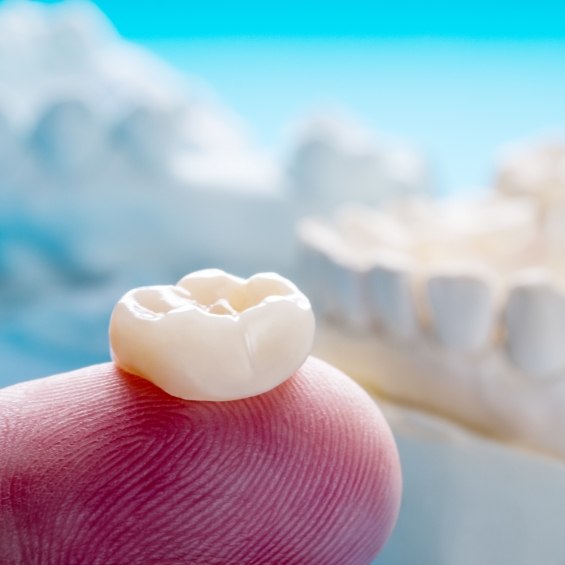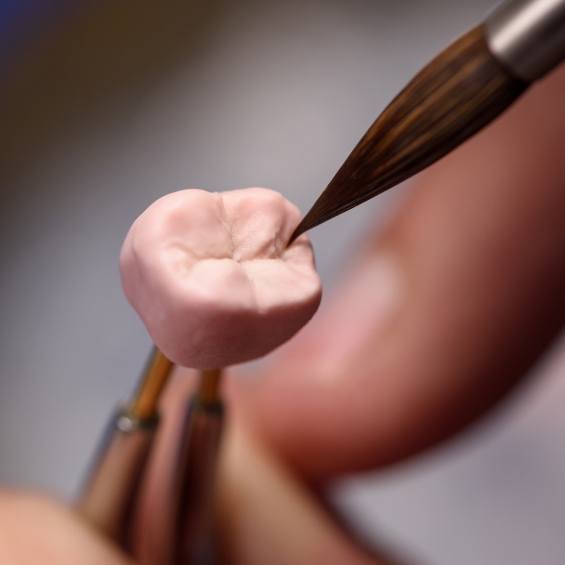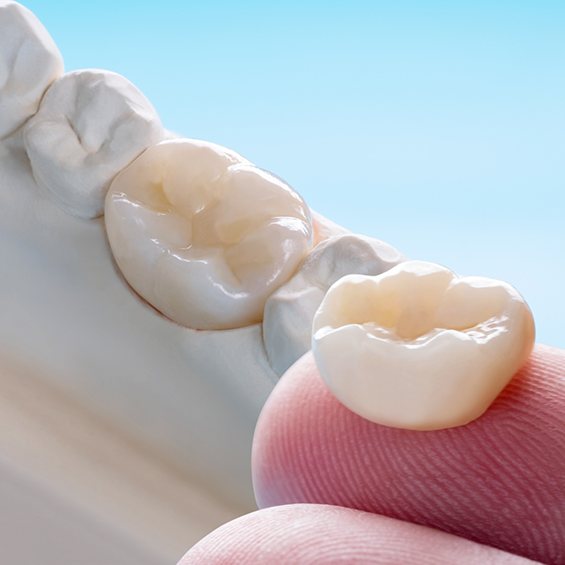Dental Crowns Simpsonville
Seamlessly Restoring Damaged Teeth for Flawless Smiles
Dental crowns are a common restorative procedure. Also known as a “cap,” this restoration can strengthen a weak tooth, restore a decayed tooth, and enhance the appearance of an aesthetically flawed front tooth. If you have been told you need a dental crown, you can look forward to a sturdy, attractive restoration when you visit the team at Tylan Creek Family Dentistry. Keep reading to learn more about dental crowns in Simpsonville, SC.
Why Choose Tylan Creek Family Dentistry for Dental Crowns?
- CEREC Same-Day Crowns Available
- We Capture Impressions Digitally
- Various Materials Used for Maximum Support & Durability
What is a Dental Crown?

A crown is a covering that restores or enhances the form and/or function of a damaged tooth. It is securely bonded over a tooth that has been reshaped to make room for the restoration.
A dental crown can be made out of gold, ceramic/porcelain, zirconia, or metal alloys. The material that is right for you depends on the location of the tooth and your personal preference. Damaged teeth that are in the front of the smile are best restored with natural-looking ceramic, for example.
What is the Procedure for a Dental Crown?

Tylan Creek Family Dentistry provides patients with two different types of crowns: CEREC (same-day crowns) and traditional lab-fabricated crowns (temporary crown followed by final crown cementation 2-3 weeks later). Each type of crown is used for different purposes. Our dentists at Tylan Creek Family Dentistry want to provide patients with the best restoration for their individual needs, and they do so by completing an initial examination to determine the health and condition of the existing tooth structure.
Tylan Creek Family Dentistry has invested in advanced CEREC technology. It stands for chairside economical restoration of esthetic ceramics, and it’s a method that allows your dentist to plan for, prepare, and place your crown -- all from the comfort of our dental office thanks to CAD/CAM software and an in-house milling machine.
First, your dentist will remove any decay or damaged tissue and reshape your tooth. Enough enamel is removed until it has the form of a cone, with a wider base and narrower at the top. A digital scan is taken of the tooth and sent to the CEREC software, where your dentist creates an electronic blueprint. The crown can be securely bonded on top after it’s manufactured according to your specific measurements.
Maintaining Your Dental Restoration

With proper care, a crown can last for many years. While decay cannot form on ceramic or other materials, the teeth and gums surrounding your restoration are still vulnerable to cavities and infection.
Continue to brush your teeth for two minutes, twice daily, and floss at least once a day. Wear a sportsguard or mouthguard if you play sports or grind your teeth at night. Visit your dentist twice annually for checkups and cleanings and get in touch with your dentist right away if your restoration breaks or becomes loose for any reason.
Dental Crown FAQs
Are dental crowns permanent?
A dental crown is designed to serve as a long-term solution, but it isn't a permanent fix. Eventually, the restoration will need to be replaced. You can prolong the lifespan of your crown by following your dentist's aftercare instructions, like brushing and flossing.
How long do dental crowns last?
The average dental crown has a life expectancy of 5 to 15 years; however, it's not unusual for them to last for much longer with the right care. Various factors affect the duration of your results, like the material used and the location of the crown. Back teeth undergo more wear and tear than the front. Crowns used for molars can have a slightly shorter lifespan. Your oral hygiene habits and lifestyle factors can also play a role. Brushing, flossing, and using a daily mouth rinse can safeguard your investment.
Visit your dentist twice a year for a cleaning and checkup. It's best to maintain a healthy diet that's limited in sugars and starches. Eat hard or sticky foods in moderation. Your dentist will also recommend breaking any bad oral habits, like chewing on your fingernails or using your teeth in place of scissors.
Do dental crowns get cavities?
Crowns aren't vulnerable to decay, but that doesn't mean you can stop brushing and flossing. Your underlying tooth can still be compromised. Buildup, where the crown meets the gumline, can allow bacteria to damage the tooth. Over time, small cracks can develop in the bonding material holding the restoration in place. Bacteria can gain access to your tooth, causing decay under the crown. With the right care at home and regular trips to your dentist, you can promote a cavity-free smile.
Are dental crowns covered under insurance?
Every insurance policy differs, but most plans cover dental crowns when medically necessary. It's unlikely your benefits will cover the entire cost, but they can pay 50% to 80% after meeting your deductible. You may also be able to use your coverage to lower the cost of certain steps in your plan, like the consultation or root canal therapy. A member of our team will work on your behalf with your dental insurance to maximize your coverage. They will explain how your benefits are being used and if there is any remaining balance. We offer several solutions for any out-of-pocket expenses.
Do dental crowns feel natural?
Your crown is custom-made to fit your tooth like a glove. It will feel smooth and sleek when running your tongue over it. Although it may take a few days to get used to your crown, you may forget it isn't part of your natural tooth in no time at all.
